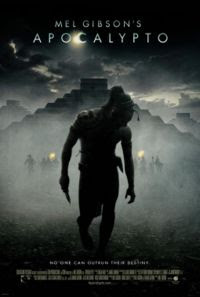Apocalypto: A Head-Lopping Celebration of Family Values

As I said in a comment on another intrepid film lover's Blog, If I avoided every movie, book, painting, or piece of music created by an artist who said and/or did loathsome things, the sum total of the works of art that would pass through that filter could be counted on Mickey Mouse's right hand. Some separation of art from artist is always necessary. And though I will concede that separating Gibson's work from his offscreen antics of late is a mammoth challenge to anyone who doesn't have the words 'Imperial Wizard' inscribed on his name tag, it's not gonna keep me out of the theater.
Enough with the brouhaha. Divorced from its notorious architect, is Apocalypto worth seeing? Absolutely. Is it perfect? Not by a longshot. But it kept me glued solid to my seat, and I want to see it again.
The story centers around Jaguar Paw (Rudy Youngblood), a young villager whose tribe hunts the forests of South America just before the arrival of Spanish explorers. Early on in the film Jaguar Paw's village is massacred by a Maya war party, and he's one of several tribesmen abducted and spirited away by the intruders to the opulent and imposing city of the Mayans. From there Apocalypto becomes an odyssey of torment, quasi-mysticism, pursuit, and revenge.
Gibson hasn't made some all-encompassing masterpiece here. The Mayan civilization provides ripe metaphoric turf (its grandeur-built-atop-blood-and-pain is really just ancient Rome, Nazi Germany, or--some cynics might argue--Bush Administration-led America in early Mesoamerican drag), but Apocalypto eschews socio-political subtext and hews close to the plot schematic of a western--even the male-buddy bonding in the film's opening scenes is pure John Ford (give or take the animal-testicle eating). For its final third, it strips itself down even more, to a succession of action and pursuit scenes spiked with some extremely overheated melodrama.
It could also be convincingly argued that, for all of the incredible logistic detail here, Apocalypto never penetrates the surface of the Mayan civilization that serves as its collective antagonistic force. Jaguar Paw's Mayan Warrior abductors, in particular, are a pack of sneering caricatures (all they're missing is giant waxed moustaches to twirl).
But it's a testament to Apocalypto's overall effectiveness that the above quibbles meant diddly to me while I was watching. Seasoned audiences will note strains of other movies in Apocalypto's framework--Last of the Mohicans, The Fugitive, and Gibson's own Braveheart, among them--but the fact remains that Gibson learned his action-movie chops at the feet of some of the greatest directors to dabble in the genre, and he and his editors engineer the chase scenes with the kinetic exhilaration of masters.
Apocalypto also accomplishes something that few of today's movie epics manage: it immerses its audience into a distinctive time and place that we have never seen before on this scale. The very effective cast of unknowns, the authentic Yukatek Mayan dialogue, Dean Semler's terrific cinematography, and the painstaking visual detail combine to lend a real air of authenticity to the proceedings. It's an unflinchingly brutal (bring a strong stomach to the theater, folks) but utterly irresistible world.
You're likewise not gonna see another big-studio epic this distinctively personal come shuffling up the pike again soon, either. Gibson will probably never be one-100th the cinematic storyteller that John Ford and Sam Peckinpah (to name two obvious role models) became, but his continual re-examination of recurring themes--the distinctively Catholic link between pain and redemption and the irredeemable nature of unchecked authority and power, among them--just screams auteur.
The director spends a lot of screen time on Jaguar Paw's relationship with his wife and child, so when they end up as key players in the movie's far-fetched climax, it's as heartfelt as it is ridiculous--and a window into Gibson's other big thematic fixation: the family. Yep, in the end Apocalypto is an exotically-set but completely earnest celebration of family values, with a few beheadings and heart-rippings thrown in.


Comments